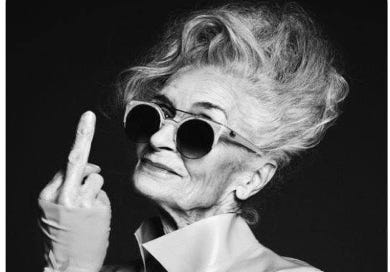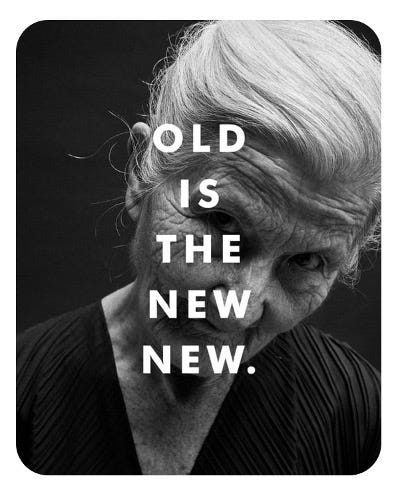In response to a recent substack, where I expounded on the importance (once again, I am nothing but consistent) of eradicating “anti-aging” vernacular from our brands — and our brains — I received a poignant comment privately (and I am paraphrasing) “Why do you bother? The beauty industry won’t change.”
Great question.
While adhering to the familiar can feel reassuring and provide comfort, especially amid our surge of global anxiety, the opposite holds true — our well-being is enhanced when we embrace change and challenge the fear-driven status quo.
THE SCOPE OF AGING
The reach of the term “anti-aging” extends far beyond marketing for the $646 billion global beauty and personal care market; it perpetuates broader ageism issues that have adverse effects on society. The United Nations Department of Economic and Social Affairs has declared that “ageism is associated with poorer physical and mental health, increased social isolation and loneliness, greater financial insecurity, decreased quality of life and premature death.” And it’s damaging more than our psyches but our wallets, as ageism had led to an excess of $63 billion in healthcare. Consider the potential impact a reduced burden could have on women's health research, which is chronically underfunded and lacks understanding (and effective treatments) for women's health issues.
Closer to our own Into the Gloss-esque shelves teeming with anti-aging products, ageism affects us from an early age. Just ask the 28% of 18-24-year-olds regularly worrying about signs of aging. It’s often more than we care to admit beyond our close confidants or with the aestheticians we have on speed dial. Unless you are Sarah Miller, the author who happily opened up in her recent New Yorker essay, “Desperate for Botox”:
Someone recently asked me why I bother getting Botox knowing that at a certain point it will no longer help me look younger. I wanted to give an earnest reply but couldn’t manage anything other than sarcasm: Why get a stent in your heart if you’re just going to die someday? Why have a child if it’s just going to grow up and move out of the house? I liked my younger face. We had a good life together. That face is dead now. At times, my grief about this loss is as overpowering as anything I’ve felt over a death or a lost relationship. There is the invisibility that middle-aged women speak of, but the moments of visibility aren’t that great, either. I used to ask men for directions, and there would often be a look in their eyes like, “This is my lucky day.” Now it’s more often, “Why doesn’t this bitch know where she’s going?”
— Sarah Miller, The New Yorker
This is not about whether you get injectables, but about how you embrace life.
Although the anti-aging market is projected to reach $2.29 billion by 2032, with an expected CAGR of 7.6% over the next eight years, I have felt a noticeable shift in conversations around growing older. The brilliant
, in her recent Vogue Business op-ed titled “Are we heading for a beauty burnout?", also perceives this decline:“The average beauty routine expands in direct proportion to political upheaval. Call it the Aesthetic Index… A broken healthcare system turns beauty and wellness into forms of self-medication. Job insecurity reframes beauty as survival (studies show that attractive people are more likely to get hired… The extensive routines that define 2025 don’t exist in spite of the political chaos, but because of it.)”
It feels like the “Lipstick Index” —the phrase coined by Leonard Lauder to describe the surge in lipstick sales during the economic downturn post September 11th attacks — on fillers. We’re bloated with beauty and the fight against aging. Even the “Sephora Kids,” who led demographic spending with $4.7 billion in 2023, seem to have pulled back from their retinol “obsession.” Then again, it could be the proposed California bill banning the sale of anti-aging products (including those with retinol) to anyone under 18 already having an impact.
REPLACING TOXIC STEREOTYPES
Trinny Woodall — the admirable British beauty entrepreneur, businesswoman, and founder of her namesake cosmetics brand has said, “Fear makes us paralyzed, and fearless opens up endless opportunities.” Maybe it’s my optimistic nature, but from my vantage point — having written about fashion, beauty and wellness through the lens of aging since 2017 — there is an observable change where intrinsic qualities are becoming more prominent than mere outward appearances. That as AI continues to advance, we have begun to celebrate the richness of connections more and are cherishing what we gain with time, rather than dwelling on what we lose along the way.
The recent renaissance in reading, thanks to #booktok and dynamic women like
, has also showcased the importance of sharing stories and embracing vulnerability. While “community” may feel like a trendy catchphrase, the longing for inclusion and belonging is fundamental. Especially as women grow older and encounter challenges in visibility, forging connections and wielding empowering words are crucial for our well-being. More than a creaseless face.I recognize that “anti-aging” will not fade as fast as injected lines. But the objective is not merely to alter a phrase, but to revolutionize our way of thinking. I am confident we can do that together. We have nothing to fear.
And as I turn 56 next week, I intend to bother for decades to come.
** Just ask






Excellent post and more of this, Christine! Thanks, too, for the shout-out. You can read about the flak I got for using "old lady" here: https://www.allure.com/story/old-lady-debate
xo
Love this deeper reflection. We don't just need a new lexicon. We need a new paradigm. Happy birthday, beauty.